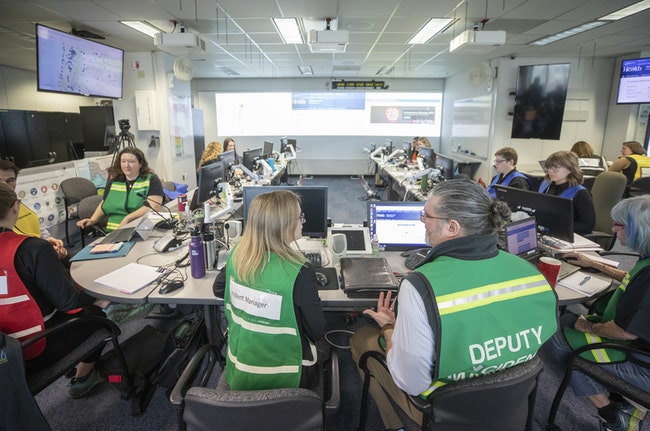 Staffers work together at the Oregon Heath Authority’s Agency Operations Center in response to Coronavirus cases occurring in the state.(Jonathan House/Pamplin Media Group)
Staffers work together at the Oregon Heath Authority’s Agency Operations Center in response to Coronavirus cases occurring in the state.(Jonathan House/Pamplin Media Group)
Here’s some good news about the coronavirus in Oregon: it’s not an emergency — at least not officially.
Currently, in Oregon 115 people are being monitored for possible exposure and three confirmed cases of the disease, COVID-19, which has killed thousands and sickened more globally.
Washington has seen a more severe outbreak with 70 confirmed cases and 10 people dead. The situation prompted Gov. Jay Inslee to declare an emergency, allowing him to direct state agencies — as well as the Washington National Guard — to respond to the outbreak.
On Wednesday, Inslee told The Seattle Times that he would consider using his authority to cancel large events if it would stop the spread of the coronavirus.
Gov. Kate Brown hasn’t invoked emergency powers yet and isn’t planning to. Spokesman Charles Boyle said that the Oregon Health Authority has the resources it needs and isn’t experiencing any administrative challenges.
Emergency declarations are often made in response to local situations and come at the request of cities or counties. The declarations allow the governor to push through red tape to direct state resources at the problem.
“We are not at that point,” said Boyle.
So far, public health officials have asked people to voluntarily quarantine or isolate themselves if they suspect they’ve come into contact with the virus. While there’s no indication it’s being considered, Oregon law allows local and state authorities to force people into quarantine.
Here are some of the tools state government has to deal with the outbreak if it becomes severe.
What are the Oregon government’s emergency powers?
After declaring a state of emergency, the governor can suspend state agency rules or orders and assume direct control of all government operations. The governor can also assume control of local police, issue orders to stop price gouging and close roads and highways.
The governor can also activate the National Guard to provide health care services.
Rep. Paul Evans, a Monmouth Democrat who chairs the House Committee On Veterans and Emergency Preparedness, said that he could see the governor invoking emergency powers if the mortality rate from the disease (which the World Health Organization puts at 3.4%) increases significantly or it becomes a significant drag on the economy.
“I don’t think we’re at that point yet,” said Evans. ”But she has that authority.”
Can the government forcibly quarantine people suspected of carrying a disease?
Yes.
Under Oregon law, the state and local public health directors can issue emergency orders directing a person or group of people to be put in isolation or quarantine if they present a “clear and immediate danger to others.”
However, officials must first attempt to convince infected individuals to voluntarily undergo treatment and quarantine. The law specifies that people in quarantine be kept in the least restrictive conditions possible. The law also allows them to challenge their quarantine in court.
Local public health directors can also ask for court orders authorizing the isolation or quarantine of people.
In response to the outbreak of coronavirus, the Chinese government put Wuhan, a city of 11 million where it originated, on lockdown.
Carlos Crespo, vice provost and professor with the PSU-OHSU School of Public Health, said it’s not clear how effective the quarantine was because the Chinese government hasn’t provided complete data.
“It’s hard for us in public health and epidemiology, without data, to know what’s happening,” he said.
He said that a similar lockdown in the U.S. would be practically impossible because of entrenched attitudes about the scope of government authority.
Crespo added that the government runs the risk of people hiding their symptoms to avoid involuntary quarantine. But asking members of the public to voluntarily isolate themselves has its own difficulties as people are reluctant to miss work or school.
“It’s easier said than done,” he said.
Has the government forcibly quarantined people before?
Yes. But it hasn’t been done on a large scale in a while.
Old media accounts show that government officials in Oregon have used emergency powers to force people into quarantines to stop the spread of disease.
In 1916, the governor of Oregon ordered children arriving at railroad stations to be examined and quarantined if they showed signs of a disease that caused infantile paralysis. A year later, local governments were authorized to quarantine people with venereal diseases and a detention facility was set up in Multnomah County to isolate “women of the underworld who are found to be diseased.”
Amid the Spanish flu pandemic, the Portland City Council in 1919 considered an emergency ordinance requiring people to wear masks while in public gatherings.
Jonathan Modie, spokesman for the Oregon Health Authority, didn’t cite any instance where the state public health director issued an emergency quarantine. He said that local public health authorities sometimes use emergency orders, particularly with people diagnosed with tuberculosis who don’t voluntarily isolate themselves.
“I think most of the time people cooperate,” he said.
Contact reporter Jake Thomas at 503-575-1251 or [email protected] or @jakethomas2009.









